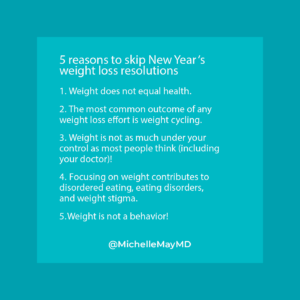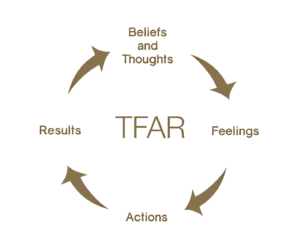On January 1st, millions of people will make a New Year’s resolution to lose weight. I hope you aren’t one of them!
You may be thinking, “What?! Don’t resolve to lose weight? But it’s a tradition; I do it every year!”
Here’s the problem: Despite our cultural obsession with weight loss, studies have proven that diets don’t lead to lasting changes in weight or health for the majority of people! (I co-authored an article about this in Nutrition in Clinical Practice called “The consequences of a weight‐centric approach to healthcare: A case for a paradigm shift in how clinicians address body weight.”(1))
After all, if diets worked for lasting change, you’d resolve to lose weight once, and that would be the end of it!
5 reasons to skip the New Year’s resolution to lose weight
1. Weight does not equal health.
 Weight and health are not as closely linked as most people—including most health professionals—believe.
Weight and health are not as closely linked as most people—including most health professionals—believe.
There is significant evidence that some larger-bodied people are physiologically healthy, while some thin people aren’t. A person’s weight is only one small piece of information and it is a huge mistake to make assumptions based on weight alone.
The reason there is so much confusion about weight and health is that correlation is often conflated with causation. While weight is correlated with osteoarthritis, sleep apnea, hypertension, diabetes, and heart disease, the available data cannot confirm that weight (or BMI, body fat percentage, waist circumference, or any other number of other metrics that are used) caused these diseases. Causality can only be inferred by experimental design, which is difficult to do.
To understand this concept better, consider the study that showed a correlation between baldness and heart disease.(2) Based on this study, we don’t assume that baldness causes heart disease! And we don’t assume that getting a hair transplant will cure or prevent cardiac disease. Yet we see comparable advice in the weight literature.
Similarly, other factors may partially or fully explain the links between weight and health, such as social determinants of health, exercise, nutrition, insulin resistance, and weight stigma. These other factors may increase disease risk at the same time they increase the risk of weight gain.
2. The most common outcome of any weight loss effort is weight cycling.
The most common outcome of any weight loss effort is not sustained changes in weight or health, but weight cycling—repeatedly losing then gaining weight—which has been associated with poorer health outcomes.
In a review of 31 long term studies on dieting, Medicare’s Search for Effective Obesity Treatments: Diets Are Not the Answer, the authors found that:
- The majority of individuals are unable to maintain weight loss over the long term
- One-third to two-thirds of dieters regain more weight than they lost.
They concluded that, “there is little support for the notion that diets lead to lasting weight loss or health benefits.”(3)
Weight cycling is associated with increased inflammation, hypertension, insulin resistance, dyslipidemia, and poorer vascular outcomes and increased mortality risk.(4)
In a study of 10,428 women, those who weight cycle gain more weight and have greater depressive symptoms. (5)
In my work with thousands of people, weight cycling is associated with guilt (the eat-repent-repeat cycle), shame, lower self-esteem, and postponing one’s life and happiness!
Bottom line: Weight cycling is damaging to people both physically and psychologically.
3. Weight is not as much under your control as most people think!
One researcher concluded, “Weight is determined by a complex set of genetic, metabolic, physiological, cultural, social, and behavioral determinants – not all of which are always within an individual’s control.”(6)
Your body weight is defended by a powerful biological system that reacts to a negative energy balance (fewer calories available than are needed) by lowering your metabolism and increasing hunger, food preoccupation, and hedonic (pleasure) responses to food.
Any of us who’ve been on any kind of a restrictive diet know this, because at some point, it seems like all you can think about is food! And there are biological reasons that happens.
For example, in an interesting study of 14 contestants in one season of The Biggest Loser, the participants lost an average of 128 pounds. As expected, their average resting metabolic rate (RMR) dropped by 611 kcal per day (meaning they needed 611 calories less each day to maintain their new weight). Six years after the weight loss, all but one had regained considerable weight and their metabolism declined even further, to 704 kcal/day below their baseline.(7)
In another study, one year after initial weight reduction, levels of appetite hormones that encourage weight regain after a weight loss diet do not return to normal levels recorded before weight loss. (8)
4. Focusing on weight contributes to disordered eating, eating disorders, and weight stigma.
Focusing on weight can also contribute to disordered eating, eating disorders, and weight stigma, all of which are detrimental to well-being.
The cultural focus on weight as a problem fuels weight stigma. This stigma often becomes internalized, fueling the belief that you must lose weight to be valued as a person. That is simply wrong. You are worthy and valuable as you are right now and you deserve to live free of bias and prejudice no matter what you weigh.
Overall, focusing on weight as the primary measure of health does more harm than good.
We have written extensively about the evidence in support of shifting the focus from weight to well-being. I won’t attempt to review that again here but if you’re not familiar with this research, please read my article published in Nutrition in Clinical Practice called, “A case for a paradigm shift in how clinicians address body weight,” (1) and check out these resources.
5. Weight is not a behavior!
By definition, goals and resolutions must be centered around actions you can take. Since weight is not a behavior, changing your weight cannot be a resolution!
Furthermore, when weight loss is the result of an unsustainable New Year diet and exercise plan, it will not create lasting change in your health or vitality.
On the other hand, when you make specific small changes in the way you eat, move, and practice self-care, you gradually build a sustainable pattern that reinforces itself. Rather than setting a goal to lose an arbitrary number of pounds or pant sizes, resolve to think differently about eating, activity, and self-care.
Two reasons most New Years resolutions are doomed to fail
Many of us look forward to the fresh start of a new year. People often set resolutions to lose weight, clear clutter, balance their budget, or create a life they love (my personal favorite).
Unfortunately, most resolutions will be a distant memory by February.
Most goals and resolutions are doomed to fail because of two critical mistakes: A lack of guiding intention (your “why”) and failing to change the way you think.
Reason #1: You lack a guiding intention
Although we’ve all read many articles about successful goal setting and resolution writing, without having a guiding intention, a goal keeps you focused on doing with the expectation of some reward, acknowledgement, or happiness when you cross the finish line.
When you set a New Year’s resolution to lose weight, your “success” is based on an external result that’s off in the future, and may or may not actually happen due to numerous factors beyond your control. In the meantime, temptations are everywhere, so to stay on course, you muster your willpower and fixate on the future.
If you do accomplish the goal, the satisfaction is often temporary and your new goal becomes “maintenance”—hardly inspiring–and very difficult (see 3. above). If your goal is not achieved despite your best effort, you feel discouraged, disappointed, or even ashamed. You are likely to “quit” your New Year’s diet and/or your New Year’s exercise resolution, only to set another goal when you feel bad enough.
On the other hand, intention setting is the practice of living in alignment with your values now. Your focus is on being based on the internal state you wish to create.
With your intention in mind (your “why”), you have the flexibility to adapt to the ever-changing present moment. When inevitable obstacles and opportunities present themselves, your intention guides your attitude and actions based on your principles.
Unlike hoping you’ll accomplish a goal that you’ll celebrate (or cross off) in the future, your beautiful life unfolds moment by moment.
For example, when your intention is to eat mindfully in order to feel good now, you make conscious decisions about when, what, how, and how much to eat by considering your available options. Your awareness of your physical sensations, your thoughts, and your feelings provide continuous feedback about how close you are to your intention. When (not if) you overdo it, your body lets you know. Without judgment, you learn from your necessary mistakes and make continuous adjustments based on the intrinsic “reward” of feeling good now.
Reason #2: You don’t address your biggest hurdle – destructive thought patterns
It’s easy to stay stuck in the habit of doing something even when it’s not working for you. That is because of TFAR.
 TFAR is an acronym that stands for Thoughts, Feelings, Actions, Results.
TFAR is an acronym that stands for Thoughts, Feelings, Actions, Results.
Meaning, your Thoughts lead to your Feelings, which guide your Actions, that become your Results. Your results end up reinforcing your original thoughts, eventually becoming beliefs and that drive your habits.
Personally, learning about TFAR changed my life! Once I finally understood that following a diet was merely an action that didn’t address the underlying thoughts and beliefs that drove my habits, I stopped making weight and diet New Year’s resolutions that were doomed to fail!
Changing your initial thoughts changes everything that follows, transforming old habits into new, more effective beliefs and behaviors.
What’s one small change you can make to your thoughts that might actually lead to the results you want?
It’s not your fault that your New Year’s Resolutions to lose weight didn’t work!
The most unfortunate thing about New Year’s weight loss resolutions is that when you feel you’ve failed to live up to whatever expectations you set for yourself, there’s a temptation to believe there’s something wrong with you.
There is nothing wrong with you!
The last twenty years of my life have been spent helping people understand, repair, and restore their relationship with food so they can experience the big, vibrant life they’ve been craving all along.
I want the same for you, but it won’t come from a resolution. It will happen when you take the time to address the core of what drives your actions. That discovery will empower you to be in charge so you’re in the driver’s seat of your own life!
Instead of Weight Loss Resolutions, Try These Instead
Since weight loss resolutions are doomed to fail, should we throw out New Year’s resolutions altogether?
That’s certainly up to you, but I like the fresh start offered by a new year as much as anyone. I just won’t resolve to lose weight anymore.
Instead of another New Year’s resolution to lose weight, this year, when you sit down to write your goals, first set your intention for how you want to feel in the present moment. (By the way, awareness of the present moment is mindfulness.)
Then, instead of setting arbitrary, monster goals that keep you focused on some future outcome, focus your resolutions on the thoughts, feelings, and actions that align with your intention to feel good now.
Examples of choices you can make to feel good in the present moment:
- Self-talk that is encouraging and supportive.
- Eat foods you enjoy.
- Eat mindfully so you enjoy those foods more.
- Choose foods that leave you feeling good instead of sluggish.
- Eat an amount of food that leaves you feeling content instead of miserable.
- Get enough sleep.
- Move your body joyfully.
- Choose regular self-care activities.
 Your well-being is a result of the many small decisions you make about your eating, physical activity, and self-care. All these decisions, whether or not they lead to weight loss, help you feel good now rather than waiting around for something that may or may not happen in the future.
Your well-being is a result of the many small decisions you make about your eating, physical activity, and self-care. All these decisions, whether or not they lead to weight loss, help you feel good now rather than waiting around for something that may or may not happen in the future.
When you take small, sustainable steps, you are more likely to get the results you want from your resolutions.
6 Resolutions That Can Change Your Life!
Rather than another New Year’s resolution to lose weight, here are six resolutions that could change your life for the better. None of them are a quick fix, but individually, each has the power to move you in a new direction.
(Write your own resolutions too! Here’s a one-page guide: 7 Steps to Magnetic New Year’s Resolutions.)
Resolution #1: I accept myself as I am right now.
While it may seem counterintuitive, self-acceptance is the starting line for change. Accept who you are and where you are right now, including your perceived faults. This is an important resolution because self-acceptance breeds self-care.
Certainly there may be some things you wish to change, but it’s important to love yourself unconditionally first—no strings attached. By accepting yourself, imperfections and all, you’ll begin to appreciate your own uniqueness and respect your body and self.
You may worry that if you stop trying to lose weight and accept yourself as you are, you’re just “giving up.”
There is no evidence whatsoever that the majority of people who diet and lose weight will keep it off, and many people who repeatedly attempt weight loss end up emotionally depleted and less physically healthy.
Besides, if you are unable to accept and love yourself as you are now, it is unlikely you will ever be satisfied with yourself no matter what changes you make.
 On the other hand, there is a growing body of evidence that mindful eating can help you break the eat-repent-repeat cycle, improve dietary balance, rediscover joy in non-punitive physical activity, increase self-acceptance, improve self-management of various chronic diseases, and more. All of these changes will make you healthier at any size.
On the other hand, there is a growing body of evidence that mindful eating can help you break the eat-repent-repeat cycle, improve dietary balance, rediscover joy in non-punitive physical activity, increase self-acceptance, improve self-management of various chronic diseases, and more. All of these changes will make you healthier at any size.
You can replace futile dieting with learning how to listen to and trust your body’s signals, giving yourself permission to eat what you love without guilt, and treating yourself with the compassion and respect you deserve.
So, while accepting yourself as you are might mean giving up on all-consuming, unsustainable dieting, it doesn’t mean you’re giving up on the pursuit of well-being and a better quality of life.
Choose to practice loving yourself as you are, gently, compassionately, mindfully, and persistently.
Resolution #2 – I won’t measure my self-worth by my weight.
Focusing on a number on the scale and wishing it was somehow different distracts you from living your life fully. Unfortunately, many of us have been convinced that this is the only way, and that we somehow deserve a life focused on what we eat and what we look like instead of living our lives.
Don’t waste anymore energy beating yourself up—energy that could otherwise be poured into building your relationships, accomplishing more meaningful goals, or simply enjoying your life.
As you begin to see your body as more than a lump of clay to be molded into some form that is finally acceptable, you’ll begin to see it as the amazing feat of nature that it is!
You are more than a body so take time to discover who you really are. I recommend exploring some of these topics in a journal. (Don’t be modest! Let yourself shine!)
- What (non-physical) attributes do you like or appreciate about yourself?
- What are your values?
- What are your aspirations?
- What do you like to do?
- What are you good at?
- What comes naturally to you that is difficult for others?
- What do you want to learn?
- What do you really care—or feel passionately—about?
This year, instead of trying to make yourself smaller, make time to get to know—and grow—yourself!
Resolution #3 – I don’t compare myself to others.
Life is not a competition. Comparing yourself to others is unfair to you and others because you are assuming you know anything about a person’s life by looking at them (or a photo).
For all you know, the person you envy is naturally slim, spends an unrealistic amount of time at the gym, is ill, or perhaps suffers from an eating disorder.
Instead, respect body diversity and appreciate that bodies naturally come in different shapes and sizes.
Resolution #4 – I listen to my body wisdom.
Your body gives you a constant stream of information about what it needs. Pause to tune in to its quiet whispers. Do you need hydration, fuel, nourishment, rest, touch, movement, play, or something else?
Try it right now: Pause to sit back, close your eyes, take a few deep breaths, and listen to your body. What is it telling you it needs (or doesn’t need) right now?
Another great way to tune in is to pause to ask yourself, “Am I hungry?” whenever you feel like eating. Notice your physical sensations, your thoughts, and your emotions. Based on this information, do you think your body needs food right now? If not, click the image below to download this guide 101 Things to Do Besides Eat which provides solutions for those moments you’re stressed, bored, tired, or any number of other triggers.

Becoming curious about your body’s signals and needs will transform your relationship with your body into a partnership.
Resolution #5 – I practice regular self-care.

Self-care is a necessity, not an indulgence. But no one else is going to say, “You know what you really need? Time for yourself!” You have to believe you deserve it and be willing to invest your precious resources to make sure you get it.
Even the little things—getting a great haircut, having a massage, restful sleep, connecting with family and friends, favorite hobbies, and quiet relaxation—contribute to your effectiveness, health, and vitality.
Care for yourself because you love and accept yourself, not so you’ll love and accept yourself. Treating yourself this way shows yourself and others that you are cared for and leads you to experience your body in more positive ways.
Resolution #6 – I live my life fully today!
Instead of putting your life on hold until you reach some arbitrary definition of beauty or success, remind yourself that this is your life and you deserve to live it fully.
Wear clothes that make you feel great, do things that make you feel brave, and make choices that bring you joy. Eat fearlessly and move mindfully in order to fuel the vibrant life you crave—and deserve.
Change is a process, not a resolution!
If you need a little inspiration (who doesn’t?), listen to my interview with Bernadette who says, “Food was something I treated myself to or tortured myself with!” She describes how the process of discovering a new relationship with food changed every aspect of her life.
If, like Bernadette, you think you would benefit from some additional support in your process, I would invite you to explore our Mindful Eating Support Community. This vibrant community is for people who are ready to:
- Break free of the bondage of chronic dieting, weight cycling, and/or overeating.
- Make connections with other people working to resolve these issues.
- Learn new ways to think, feel, and act around food.
- Free up your energy to focus on your intention of building the vibrant life you crave.
Much of what I’ve shared in this article is derived from a concept called mindful eating. If this is new to you, I’d love to share the first chapter of my book, Eat What You Love Love What You Eat: A Mindful Eating Program to Break Your Eat-Repent-Repeat Cycle.
References
- Mauldin, K., May, M., Clifford, D. (2022). The consequences of a weight‐centric approach to healthcare: A case for a paradigm shift in how clinicians address body weight. Nutrition in Clinical Practice. https://doi.org/10.1002/ncp.10885
- Yamada, T., Hara, K., Umematsu, H., & Kadowaki, T. (2013). Male pattern baldness and its association with coronary heart disease: A meta-analysis. BMJ Open, 3(4).
- Mann, T. et al. (2007). Medicare’s search for effective obesity treatments: Diets are not the answer. American Psychologist, 62, 220-233.
- Bacon, L., & Aphramor, L. (2011). Weight Science: Evaluating the Evidence for a Paradigm Shift. Nutrition Journal, 10(1).
- Madigan, C., et al. (2018). Is weight cycling associated with adverse health outcomes? A cohort study. Preventive Medicine, 108, 47-52.
- Tylka, T., et al. (2014.) The weight-inclusive versus weight-normative approach to health: Evaluating the evidence for prioritizing well-being over weight loss. Journal of Obesity.
- Fothergill, E. et al. (2016). Persistent metabolic adaptation 6 years after “The Biggest Loser” competition. Obesity (Silver Spring, Md.), 24(8), 1612-9.
- Sumithran, P., Prendergast, L. A., Delbridge, E., Purcell, K., Shulkes, A., Kriketos, A., & Proietto, J. (2011). Long-Term Persistence of Hormonal Adaptations to Weight Loss. New England Journal of Medicine, 365(17), 1597-1604.


